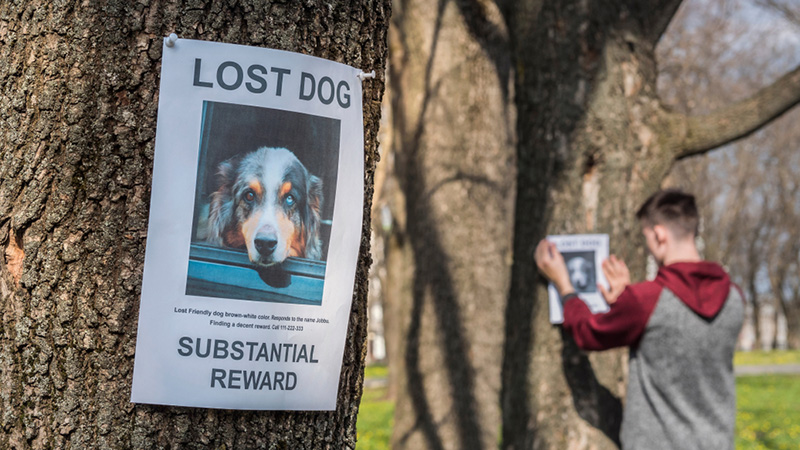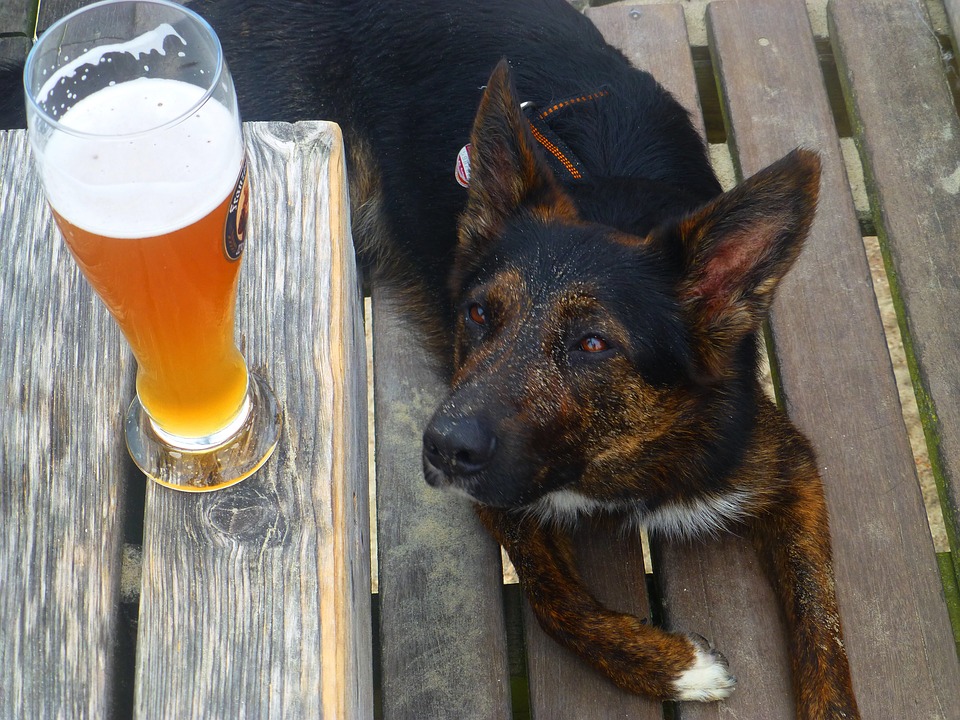When To Stop Looking For A Lost Dog?
When to Stop Looking for a Lost Dog: Considerations Explained

The amount of time you spend looking for a missing dog will vary depending on the circumstances. On the one hand, many people think it’s time to move on and realize that your cherished pet is gone if weeks or months have gone by without result. However, there is still hope if your dog has just been missing for a few days or a week and you have been actively looking without success.
These suggestions are for you if, after a prolonged search, you are still determined to bring your dog home safely: expand the search area by speaking with neighbors who may be many blocks away; distribute flyers in public areas including dog parks, pet stores, and veterinary clinics; seek expert assistance from organizations like animal shelters or pages on social media that facilitate pet-owner reunification;
Make up heartfelt stories about how much you miss your little companion to reach out to local radio stations; this will increase the appeal to listeners who could be interested in looking for him or her. If someone does locate him or her, implement incentive systems based on positive reinforcement; this will inspire individuals who had previously gone by but were cautious at first.
The decision to end the search ultimately comes down to what your gut and intuition both think is appropriate. It’s alright to realize that things might not always go as planned and send yourself best wishes going forward if you don’t genuinely think she’s out there anymore.
Table of Contents
How will I know when to stop looking for my lost dog?
Nobody likes to acknowledge that their cherished pet might be gone forever. But eventually, it may become apparent that your attempts to find and reconnect with your dog are coming to a standstill. It might be challenging to determine when to stop looking for a lost dog, but there are some situations where it is required.
If More Than 72 Hours Have Passed Since Your Dog Was Lost: Your dog’s chances of being safe after three days drastically diminish unless you have specific reports of them being spotted recently. Those chances decrease considerably more after four to six weeks when other factors like automobiles and predators start to pose a threat.
You’ve Looked Everywhere Possible: If you’ve looked everywhere possible—including local shelters, rescue organizations, and humane societies—without success, it might be necessary to halt your search so that you can concentrate on finding alternative ways to bring a new pet into your life and house.
If you keep getting bad reports or tips without any accompanying sightings, it’s because: Finding out that someone else has seen a dog that looks similar to yours does not ensure that it is the one you are searching for, particularly if they did not provide any supporting images or documentation. People can misread certain things in panic, believing they saw something else. This leads to untrustworthy sightings and tips, which, at best, render any prospective recovery attempts useless and, at worst, fraudulent wastes of scarce resources!
If the natural world sends you signals that it’s time to move on: Unfortunately, when it comes to humans, we occasionally find it difficult to let go of loved ones. However, we also recognize that a larger cycle occurs in nature every day, and that includes learning to accept when something needs to be left behind in order to keep our spirits (and futures) free to enjoy life and love!

How much time should I spend searching for a lost dog?
How long you should search for a missing dog will mostly rely on the specifics of the situation. You will probably need to search for your dog longer than if it has never happened if it was rescued or has a history of wandering off. Pet travel monitoring technologies can make searches last longer and be more fruitful, while other strategies like door-to-door canvassing and posters can assist generate flyers and leads. Hiring a specialist in animal recovery could also be beneficial; these services could include overhead monitoring or specially designed plans for negotiating challenging terrain.
Whichever path you decide on, one thing is for sure: time is of the essence when it comes to missing dogs, especially since seasonal variations in the weather might make it more difficult for your pet to be discovered safely. As a result, in addition to considering how long it has been since your pet vanished, your search plan should also examine what measures will increase the likelihood that your pet will be found as soon as possible.
When should I give up looking for my pet?
1. Determining whether to accept that your pet is beyond your reach can be extremely painful and challenging, but it can be quite beneficial for you to recognize when enough is enough. These are some indicators that your pet may be around that you should be aware of.
Have you used every resource that is available? It’s crucial to start posting on neighborhood lost and found websites and notifying the public via word-of-mouth (or social media) when searching for a missing pet.
Have you made accurate posters and included images throughout the neighborhood? Have you spoken with other communities and neighbors? Have you called any veterinarian offices or shelters in the area in case they have recently taken in stray animals? If this is the case and, despite all of these attempts, no leads have been found thus far, it might be time to take a break.
2. Has success eluded you over time? It may be appropriate to take a break after spending some time searching for your missing pet without making much headway or receiving any indication as to where they might be. Even though we always advise not giving up completely, occasionally taking a vacation from relentlessly following leads could be helpful; giving yourself some time away from home will help you get through this difficult period with optimism.
3. Are feelings fading away? A person’s emotional health may suffer if they search incessantly; if all effort seems futile and they are left feeling devastated over what has vanished, telling themselves that not much more can be done at this point may provide the necessary relief and perspective on how to proceed during such difficult times; if nothing concrete is found, finding other fulfilling hobbies or non-traditional outlets may actually support further growth; positive family conversations can be therapeutic means helpful along the journey towards restoring hope often overshadowed feel helplessness due to lack of closure attained regarding beloved animal companion(s).
In the end, realizing when efforts resulted in nothing suggests potential times when final objectives have been reached. represent a sense of completion associated with the initial efforts made to locate one’s family member(s), regardless of whether they were furry or feathered. Nevertheless, their departure left behind both sadness and happy memories that enhanced life among humans.
Animals encountered throughout the journey resolved limbo, enabling mourning loss down the road, at least partially freeing space occupied by four-legged occupants. Eventually, filled with love and renewed faith, each come trust souls meet again sky roads traverse hearts betrayed longing embrace distance cling sending limitless love guiding until finally reunify bid farewell lingering expectations reunited unconditional gifts Accept boundaries farewell, colorful hand boundless length, eternity, comfort, believing that the future will arrive, loved unaltered, and priceless for all eternity…

If I believe my dog is gone and won’t return, what should I do?
It’s likely that you’re experiencing worry if you think your cherished dog has vanished. First and foremost, try your best to maintain your composure and use reason wherever you can. You can still have a fair possibility of your dog returning home by themselves because they can run astonishingly long distances in a short period of time.
Start searching right away in the areas that your dog usually visits or that they may have ventured out to explore (local parks, trails, etc.). In the event that you are unable to locate them straight immediately, ask friends and relatives for assistance in the hunt or notify nearby residents so they can also maintain a lookout.
If at all possible, include images with your “lost dog” posters and include your contact information, such as your phone number or email address.
Investigate “collars for cope” from neighboring animal shelters that use GPS to locate missing animals; this will greatly improve the likelihood of locating them in a fair amount of time. In order to put more eyes on the ground searching for your dog, as soon as possible, be sure to file an official missing pet complaint at your local police station using social media platforms like Appatix and Lost Pets Worldwide!
Above all, keep in mind that the chances are good that your lost dog will finally find his way home, so be optimistic!
What signs indicate that my dog has gone absent for too long?
It is never the pet owner’s pleasure to consider that their cherished companion may have vanished, but sadly, this does occur occasionally, and if your dog has been absent for an extended period of time, it may be challenging to determine what to do next. Luckily, there are a few obvious indicators you can watch out for to see whether your dog has been gone for an extended period of time.
First and foremost, make it a habit to frequently check local listings and shelters in the region. Many will post as soon as they have a new employee on the premises, so knowing ahead of time what amenities are available nearby can be really helpful. Additionally, you ought to make an effort to call on doors in the vicinity of any potential sighting sites, as the owners or informed locals might know more about what transpired or who may have seen something.
Furthermore, keep observing your dog’s most frequented regions every day for a specific amount of time, especially at night when activity is more likely, for any further sightings or signals that your dog is still nearby, even if all else seems hopeless. This activity will provide valuable insights about her past experiences and future directions throughout time.
Calling any local veterinarians who might be able to identify your pet from photos should someone find her injured is another way to determine if your pet has been missing for too long. Veterinarians frequently respond quickly to sick or injured animals that have been displaced by storms or other natural disasters because they understand that depending on the severity of the situation, pets in need of medical attention may not have enough time to receive it and may even endanger their lives.
Even while many now regrettably don’t let photo posts with check-ins owing to liability concerns, it’s still worthwhile to get in touch with them so they can keep a watch on things over the next few weeks. Last but not least, remember that using social media to cast a wide net can get you one step closer to discovering him again! Posting pictures and contact information that leads back to the person directly adds another layer of protection.
Publicity also helps to locate missing people by being seen everywhere, both online and offline, which speeds up the resolution process. When combined with the precautions previously mentioned, these methods make a volatile situation much more controllable and maneuverable, which significantly increases the likelihood of success. Happy searching, hoping that some of the measure luck tips detailed here help to unite together sooner rather than later, reuniting lost pups paws parents hearts wishing best doggo snuggles safe sound homeward-bound times!
Summary
The process of looking for a lost dog is a difficult and highly emotional one. It’s critical to keep in mind that there is a large network of sympathetic people and resources available to support you and that you are not alone.
The key to overcoming this challenging circumstance is to prioritize your well-being, accept your feelings, and seek support. You can continue your search while taking care of the emotional cost by switching to sporadic checks and striking a balance between hope and reality. No matter how tiny the effort, it all adds up to the chance of you and your furry friend being reunited.
You should be steadfast, maintain your faith, and never lose hope that miracles are possible. Your relationship and love for your pet are powerful.




